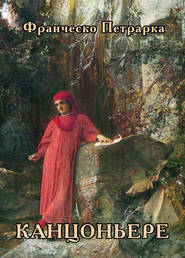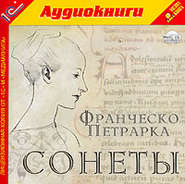По всем вопросам обращайтесь на: info@litportal.ru
(©) 2003-2025.
✖
The Sonnets, Triumphs, and Other Poems of Petrarch
Настройки чтения
Размер шрифта
Высота строк
Поля
All these and others to the combat flew,
And all combined to wreak the vengeance due
On him, whose haughty hand in days of yore
From clime to clime his conquering standard bore.
Another troop the vestal virgin led,
Who bore along from Tyber's oozy bed
His liquid treasure in a sieve, to show
The falsehood of her base calumnious foe
By wondrous proof.—And there the Sabine queen
With all the matrons of her race was seen,
Renown'd in records old;—and next in fame
Was she, who dauntless met the funeral flame,
Not wrong'd in Love, but to preserve her vows
Immaculate to her Sidonian spouse.
Let others of Æneas' falsehood tell,
How by an unrequited flame she fell;
A nobler, though a self-inflicted doom,
Caused by connubial Love, dismiss'd her to the tomb.—
Picarda next I saw, who vainly tried
To pass her days on Arno's flowery side
In single purity, till force compell'd
The virgin to the marriage bond to yield.
The triumph seem'd at last to reach the shore
Where lofty Baise hears the Tuscan roar.
'Twas on a vernal morn it touch'd the land,
And 'twixt Mount Barbaro that crowns the strand
And old Avernus (once an hallow'd ground);
For the Cumæan sibyl's cell renown'd.
Linterno's sandy bounds it reach'd at last,
Great Scipio's favour'd haunt in ages past;
Famed Africanus, whose victorious blade
The slaughterous deeds of Hannibal repaid,
And to his country's heart a bloody passage made.
Here in a calm retreat his life he spent,
With rural peace and solitude content.
And here the flying rumour sped before,
And magnified the deed from shore to shore.
The pageant, when it reach'd the destined spot,
Seem'd to exceed their utmost reach of thought.
There, all distinguish'd by their deeds of arms,
Excell'd the rest in more than mortal charms.
Nor he, whom oft the steeds of conquest drew,
Disdained another's triumphs to pursue.
At the metropolis arrived at last,
To fair Sulpicia's temples soon we pass'd,
Sacred to Chastity, to ward the pest
With which her sensual foes inflame the breast;
The patroness of noble dames alone—
Then was the fair plebeian Pole unknown,
The victress here display'd her martial spoils,
And here the laurel hung that crown'd her toils:
A guard she stationed on the temple's bound—
The Tuscan, mark'd with many a glorious wound
Suspicion in the jealous breast to cure:
With him a chosen squadron kept the door.
I heard their names, and I remember well
The youthful Greek that by his stepdame fell,
And him who, kept by Heaven's command in awe,
Refused to violate the nuptial law.
Boyd.
THE TRIUMPH OF DEATH
PART I
Questa leggiadra e gloriosa Donna
The glorious Maid, whose soul to heaven is gone
And left the rest cold earth, she who was grown
A pillar of true valour, and had gain'd
Much honour by her victory, and chain'd
That god which doth the world with terror bind,
Using no armour but her own chaste mind;
A fair aspect, coy thoughts, and words well weigh'd,
Sweet modesty to these gave friendly aid.
It was a miracle on earth to see
The bow and arrows of the deity,
And all his armour broke, who erst had slain
Such numbers, and so many captive ta'en;
The fair dame from the noble sight withdrew
With her choice company,—they were but few.
And made a little troop, true virtue's rare,—
Yet each of them did by herself appear
A theme for poems, and might well incite
The best historian: they bore a white
Unspotted ermine, in a field of green,
About whose neck a topaz chain was seen
Set in pure gold; their heavenly words and gait,
Express'd them blest were born for such a fate.
Bright stars they seem'd, she did a sun appear,
Who darken'd not the rest, but made more clear
Their splendour; honour in brave minds is found:
This troop, with violets and roses crown'd,
Cheerfully march'd, when lo, I might espy
Another ensign dreadful to mine eye—
A lady clothed in black, whose stern looks were
With horror fill'd, and did like hell appear,
Advanced, and said, "You who are proud to be
So fair and young, yet have no eyes to see
And all combined to wreak the vengeance due
On him, whose haughty hand in days of yore
From clime to clime his conquering standard bore.
Another troop the vestal virgin led,
Who bore along from Tyber's oozy bed
His liquid treasure in a sieve, to show
The falsehood of her base calumnious foe
By wondrous proof.—And there the Sabine queen
With all the matrons of her race was seen,
Renown'd in records old;—and next in fame
Was she, who dauntless met the funeral flame,
Not wrong'd in Love, but to preserve her vows
Immaculate to her Sidonian spouse.
Let others of Æneas' falsehood tell,
How by an unrequited flame she fell;
A nobler, though a self-inflicted doom,
Caused by connubial Love, dismiss'd her to the tomb.—
Picarda next I saw, who vainly tried
To pass her days on Arno's flowery side
In single purity, till force compell'd
The virgin to the marriage bond to yield.
The triumph seem'd at last to reach the shore
Where lofty Baise hears the Tuscan roar.
'Twas on a vernal morn it touch'd the land,
And 'twixt Mount Barbaro that crowns the strand
And old Avernus (once an hallow'd ground);
For the Cumæan sibyl's cell renown'd.
Linterno's sandy bounds it reach'd at last,
Great Scipio's favour'd haunt in ages past;
Famed Africanus, whose victorious blade
The slaughterous deeds of Hannibal repaid,
And to his country's heart a bloody passage made.
Here in a calm retreat his life he spent,
With rural peace and solitude content.
And here the flying rumour sped before,
And magnified the deed from shore to shore.
The pageant, when it reach'd the destined spot,
Seem'd to exceed their utmost reach of thought.
There, all distinguish'd by their deeds of arms,
Excell'd the rest in more than mortal charms.
Nor he, whom oft the steeds of conquest drew,
Disdained another's triumphs to pursue.
At the metropolis arrived at last,
To fair Sulpicia's temples soon we pass'd,
Sacred to Chastity, to ward the pest
With which her sensual foes inflame the breast;
The patroness of noble dames alone—
Then was the fair plebeian Pole unknown,
The victress here display'd her martial spoils,
And here the laurel hung that crown'd her toils:
A guard she stationed on the temple's bound—
The Tuscan, mark'd with many a glorious wound
Suspicion in the jealous breast to cure:
With him a chosen squadron kept the door.
I heard their names, and I remember well
The youthful Greek that by his stepdame fell,
And him who, kept by Heaven's command in awe,
Refused to violate the nuptial law.
Boyd.
THE TRIUMPH OF DEATH
PART I
Questa leggiadra e gloriosa Donna
The glorious Maid, whose soul to heaven is gone
And left the rest cold earth, she who was grown
A pillar of true valour, and had gain'd
Much honour by her victory, and chain'd
That god which doth the world with terror bind,
Using no armour but her own chaste mind;
A fair aspect, coy thoughts, and words well weigh'd,
Sweet modesty to these gave friendly aid.
It was a miracle on earth to see
The bow and arrows of the deity,
And all his armour broke, who erst had slain
Such numbers, and so many captive ta'en;
The fair dame from the noble sight withdrew
With her choice company,—they were but few.
And made a little troop, true virtue's rare,—
Yet each of them did by herself appear
A theme for poems, and might well incite
The best historian: they bore a white
Unspotted ermine, in a field of green,
About whose neck a topaz chain was seen
Set in pure gold; their heavenly words and gait,
Express'd them blest were born for such a fate.
Bright stars they seem'd, she did a sun appear,
Who darken'd not the rest, but made more clear
Their splendour; honour in brave minds is found:
This troop, with violets and roses crown'd,
Cheerfully march'd, when lo, I might espy
Another ensign dreadful to mine eye—
A lady clothed in black, whose stern looks were
With horror fill'd, and did like hell appear,
Advanced, and said, "You who are proud to be
So fair and young, yet have no eyes to see














